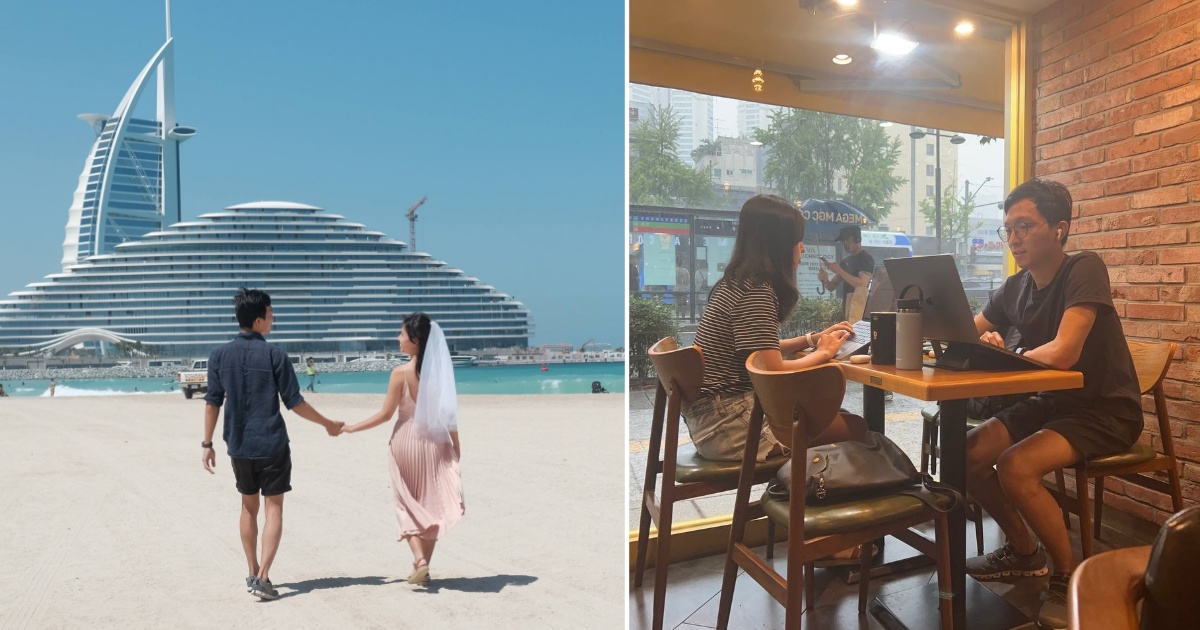One Singaporean couple is taking the road less-travelled by travelling around the world while waiting for their BTO flat.
JS, a software engineer, and Marilyn, a business owner, have been working as digital nomads since September 2021.
The couple, who document their experiences on Instagram @shrugmyshoulder, tell Mothership more about their digital nomad lifestyle.
Why did you choose to travel instead of renting a place?
We met and started dating when we were living and working in New York City. We travelled to Canada, China and North Korea.
After moving back to Singapore, we secured a BTO flat in 2020. We were both living with our families, like most Singaporeans.
 JS's proposal to Marilyn.
JS's proposal to Marilyn.
As our BTO will only be completed in 2025, we explored the idea of renting, but we also enjoy long-term travelling.
We felt that the rental money could be put to better use as part of our travel fund. Considering the steep rental price, comfort of our home in Singapore and how easy it is to meet up in Singapore, we decided to spend half of our time on the road and half of our time in Singapore.
@shrugmyshoulder 🤷🏻♂️🤷🏻♀️ Why did we start this digital nomad journey? #shrugmyshoulder #shrugtravels #singapore #singaporediscover #reelssg #sgcouple #digitalnomad #digitalnomadcouple #digitalnomadlifestyle #workandtravel #remotework #selfcare ♬ original sound - ShrugMyShoulder
How long do you take to plan before embarking on your travels and what considerations do you have?
Typically, we start to ideate on the destination and plan six months before we travel to the destination.
The reason is that, we can have time to monitor flight and accommodation prices and book them when it is at reasonable prices.
Here are some of our considerations:
When we travel – We planned our trips around important occasions as we made it a point to be back in Singapore for Chinese New Year, end-of-year family holiday gatherings and friend’s weddings. That way we can still stay connected with our family and friends without missing out on milestone events.
Where we travel – Work is our priority as that’s what’s ultimately sustaining the travels. Prior to the trip, we have to consider the internet connectivity and timezone.
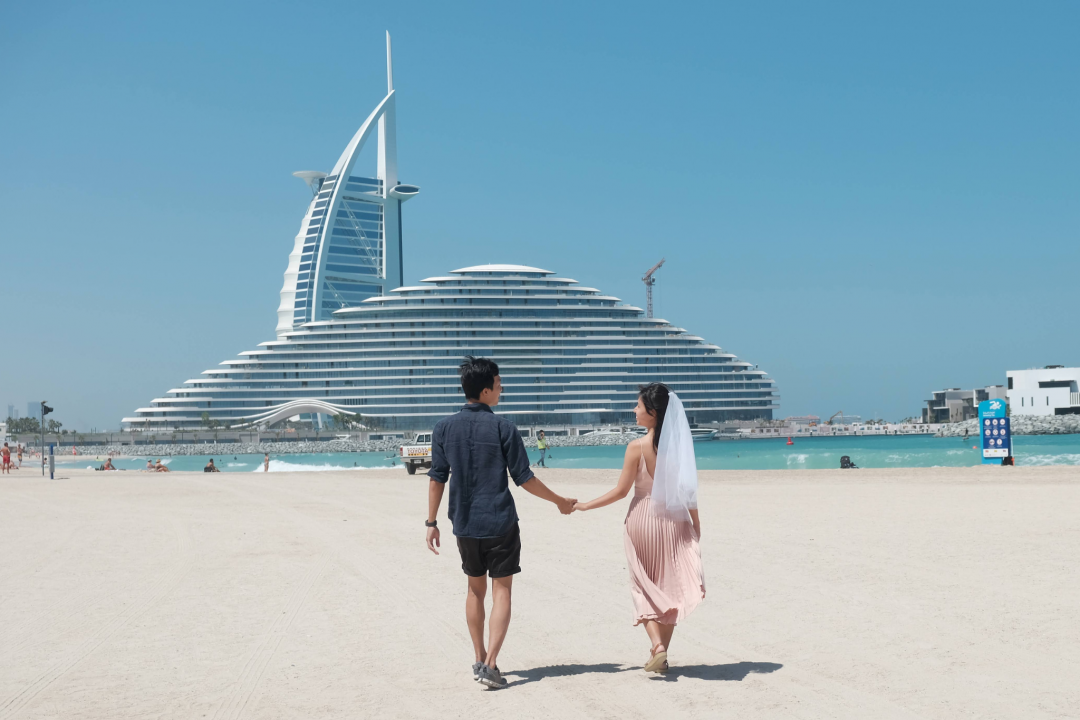 The couple in Dubai.
The couple in Dubai.
Finding accommodation with good WiFi and a comfortable workspace is the most important. We also try to get multiple backup options like SIM card with generous data plans and to stay at locations where there are cafes nearby.
Travelling as a digital nomad is unlike travelling for leisure. We have to prioritise work on the weekdays and we are not too ambitious with the number of activities and attractions to accomplish in a day.
We typically try to stay in a single location for a longer period of time as we need a stable work environment and to minimise travelling time during the weekdays.
Did your family and friends say anything about your decision to be digital nomads?
Our immediate family members and friends understood the concept of remote working, especially after the pandemic where not working from the office is more common.
It was much harder to explain to our grandparents.
They will ask if we are travelling for leisure or for work each time we’re going abroad. Over time, they gradually got used to us being away from home for much longer periods. We try to be back for important occasions so the impact is minimal.
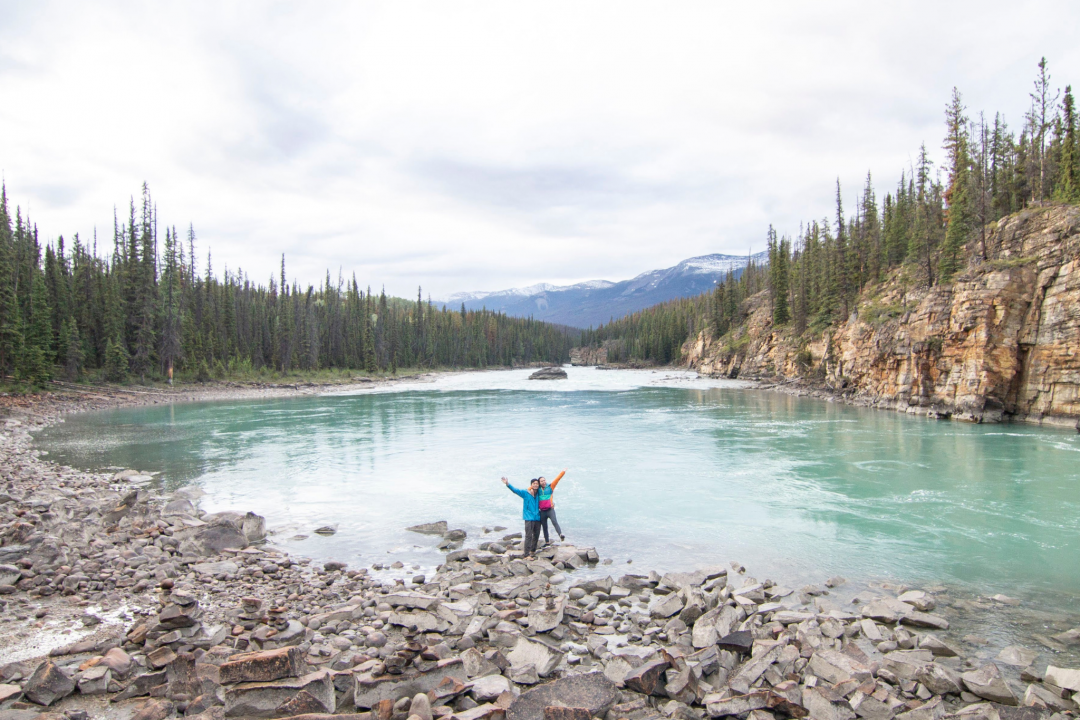 The couple in Canada. Responses to their nomadic lifestyle have been mixed.
The couple in Canada. Responses to their nomadic lifestyle have been mixed.
There is a mixed response from our friends — some felt that this lifestyle is not for them and some aspire to do the same should their work allow.
We share about our lifestyle and expenses on our blog shrugmyshoulder.com so people who are keen to give this lifestyle a try can have a peek into our life.
Can you give us a ballpark figure of how much you have spent since September 2021?
In the year of 2022, we spent a total of S$38,400 per person, which averages out to S$3,200 per month.
That includes our accommodation, flight, food, activities and miscellaneous stuff such as SIM cards.
In 2022, we were in Singapore half the time and we travelled to South Africa, Botswana, Zambia, Zimbabwe, Maldives, Greece, Turkey, Austria, Italy, Vatican City.
This figure was relatively high because we splurged on our Maldives and Africa trip, given that we originally planned for these trips and had to postpone them because of the pandemic.
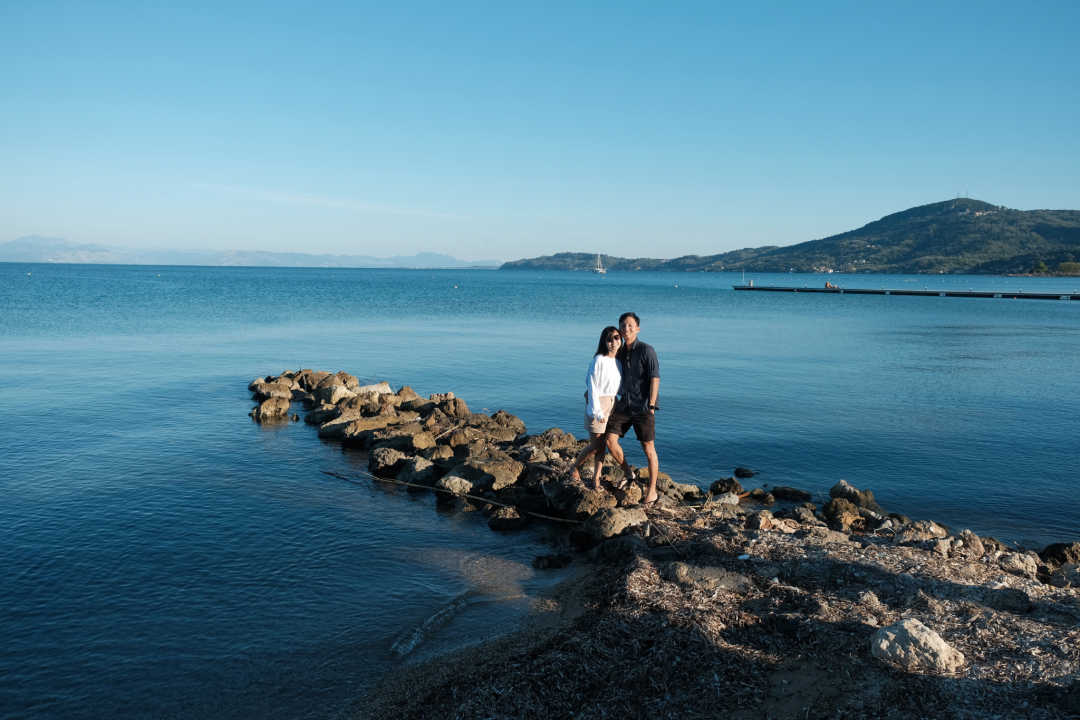 The couple in Greece. Part of the appeal of being a digital nomad, said the couple, is being able to explore different places while building up their careers.
The couple in Greece. Part of the appeal of being a digital nomad, said the couple, is being able to explore different places while building up their careers.
In the year of 2023, we are on track to spend a significantly lower amount as compared to the previous year.
As of now, from January to June 2023, we’ve spent S$10,000 per person, which averages out to S$1,600 per month. We travelled to Vietnam, South Korea, Malaysia, Thailand, UAE and Oman. To lower our cost of travel, we also redeem airline and hotel loyalty points.
@shrugmyshoulder 💰 How much we spend, Middle East 🤷🏻♂️🤷🏻♀️ — #singaporean #digitalnomad #shotoniphone #digitalnomadcouple #personalfinance #finance #shrugfinance ♬ Fire Fly (Pt.1) - Official Sound Studio
What do you enjoy about being a digital nomad?
It gives us the opportunity to travel to and explore different places while still working and building up our careers. We do not have to wait until retirement when we are at an older age to travel the world.
@shrugmyshoulder Day in our life as digital nomads in Dubai. 🤷🏻♀️M @alseefheritagehoteldubai 83usd per night. #shrugmyshoulder #singapore #singaporediscover #sgcouple #digitalnomad #digitalnomadcouple #reelssg ♬ original sound - ShrugMyShoulder
Any downsides to being a digital nomad?
As a digital nomad, we need to prioritise working over visiting attractions in a new location. Therefore, sometimes because of work obligations, we might not visit as many attractions as one might imagine.
Because we are always on the road, working conditions may not be as comfortable as working from home or office. We do not have a large monitor or comfortable chairs and have to adapt to what we get at the hotel or airbnbs.
Timezone is also another issue. When we are working in another country that has a different timezone as Singapore, we might need to wake up early or sleep much later to be on the same timezone as our coworkers or clients.
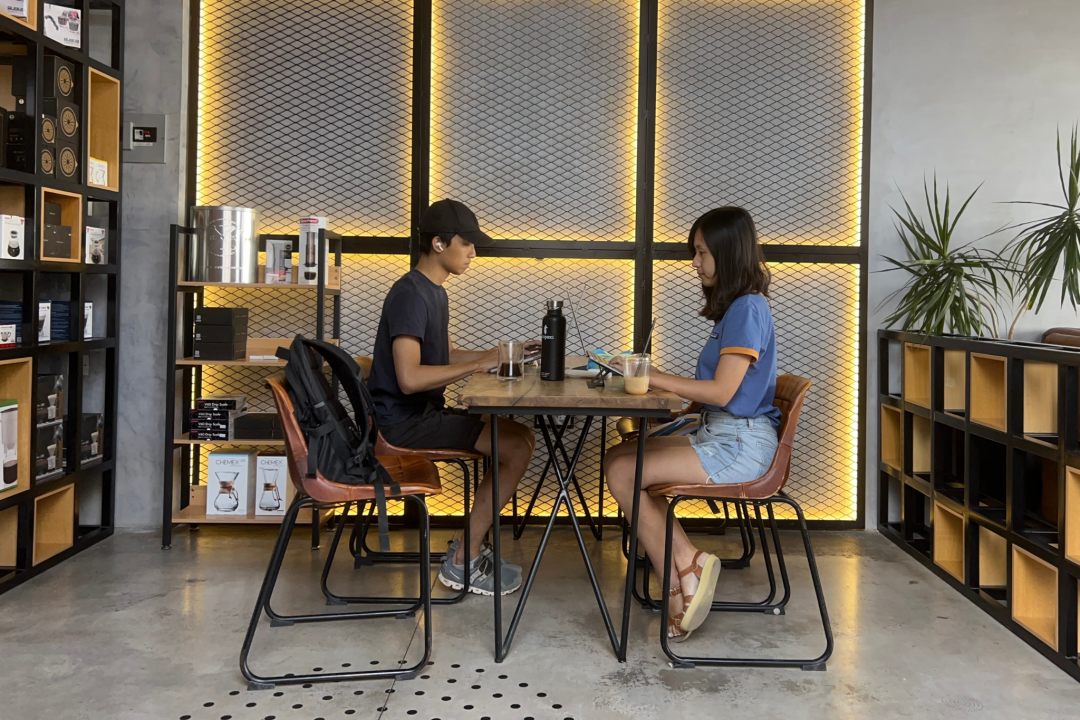 Working in a cafe in Oman. Being on the road, the couple have to content with conditions may not be as comfortable as working from home or an office.
Working in a cafe in Oman. Being on the road, the couple have to content with conditions may not be as comfortable as working from home or an office.
How do you run your business/work while overseas?
JS: It is fairly easy for me to transition to working overseas as a software engineer as most of my work requires just my laptop and a stable internet connection.
Marilyn: When we started in 2021, I had a day job and was a product manager at a tech company. Unfortunately, the company went bankrupt earlier this year. As I had a few side hustles, I decided to use this opportunity to work on them full-time.
As my role in the business is mainly business development and partnerships, I was able to perform my responsibilities remotely while my sister, who is my business partner, performs responsibilities that are needed in person in Singapore.
Were there any unforeseen issues that came up during your travels?
There were frequent blackouts (aka load shedding) in South Africa, so we had to time our meetings at the right time and communicate with our coworkers or clients ahead of time.
Besides that, we also have to deal with the uncertainty of commuting.
We experienced an incident when we were travelling from Germany to Italy. There was a strike by the railway workers which disrupted all train travels that day.
As it was a work day, we originally planned to arrive at our next destination to continue with work. We had to take a couple of hours of urgent leave to resolve the issue and find alternative transport to get to our destination.
What are your favourite stops so far?
We both agreed that South Africa and Botswana were our most interesting and memorable nomadic experiences so far.
When in Kruger, we did safari drives in the morning to see animals in the wild.
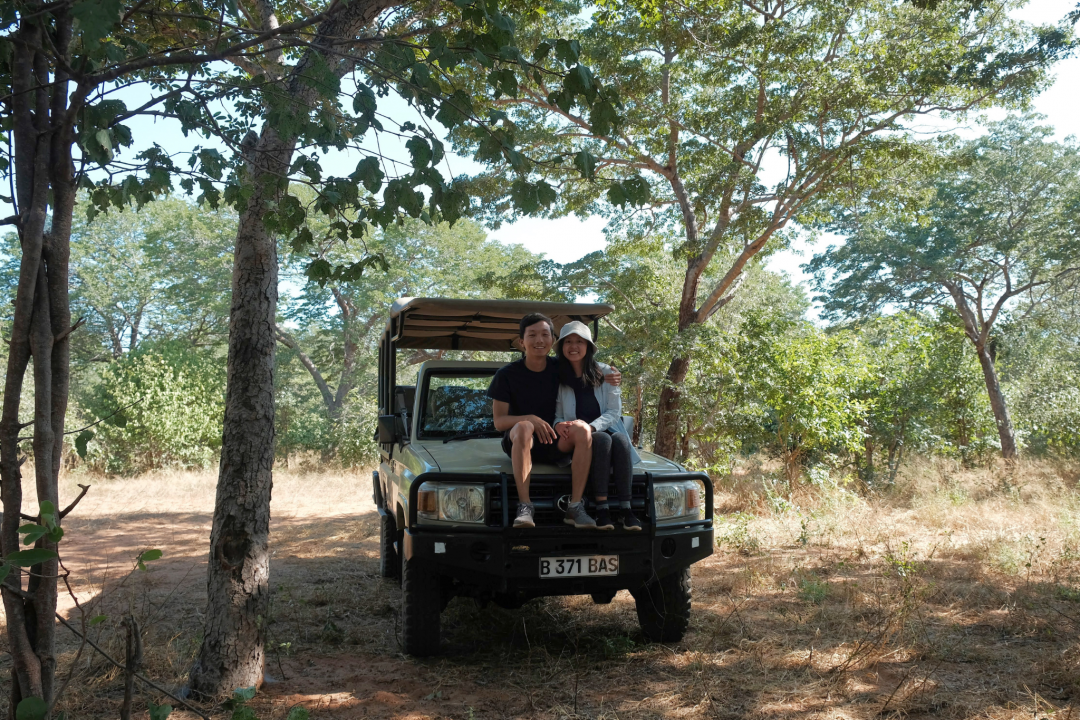 The couple in Africa. South Africa and Botswana was their most interesting and memorable nomadic experience so far.
The couple in Africa. South Africa and Botswana was their most interesting and memorable nomadic experience so far.
When in Cape Town, we did surfing at Muizenburg Beach and paragliding at Signal Hill in Cape Town and then continued working from the afternoon to night. It was a different routine compared to working in Singapore or other cities.
For the cities we have been to, we really enjoy our digital nomad stay in South Korea. The food in Korea really suits our palate and there are plenty of beautiful and aesthetic cafes with amazing Wi-Fi and a conducive environment.
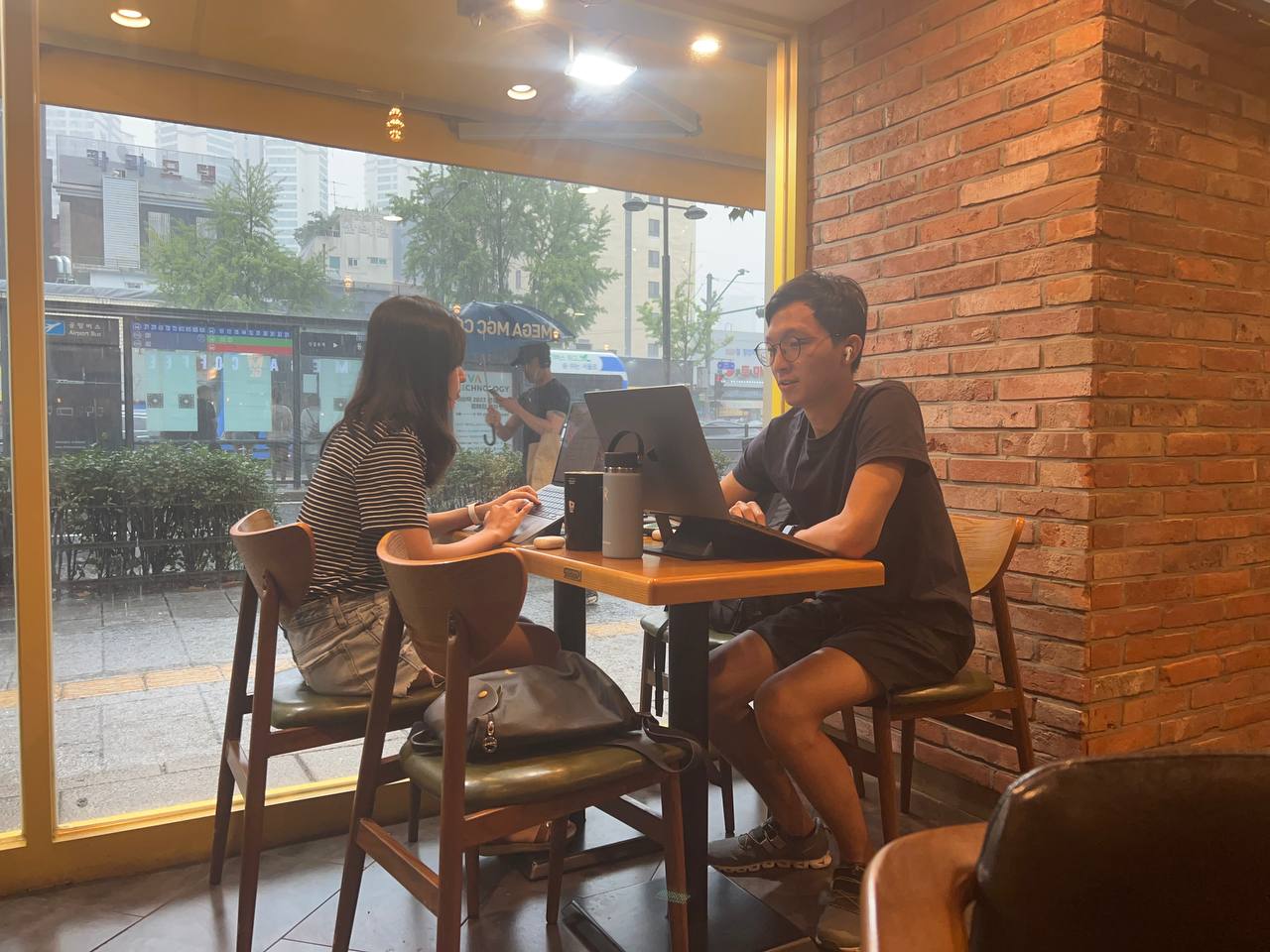 The couple working in a cafe in South Korea.
The couple working in a cafe in South Korea.
Lastly, since you started working as digital nomads, what are some lessons you learned?
Life as a digital nomad is not as easy as we imagined before we started on the journey.
There was a lot more that we need to research and prepare for before embarking on a trip.
There was also a lot less exploring involved as we needed to prioritise our work during the weekdays. We also appreciate the efficiency and comfort of living in Singapore having experienced load-shedding in Africa, a 4.6 earthquake in Turkey and bad Wi-Fi in many countries that we visited.
All photos courtesy of JS and Marilyn. You can check out their adventures at shrugmyshoulder.com.
If you like what you read, follow us on Facebook, Instagram, Twitter and Telegram to get the latest updates.

